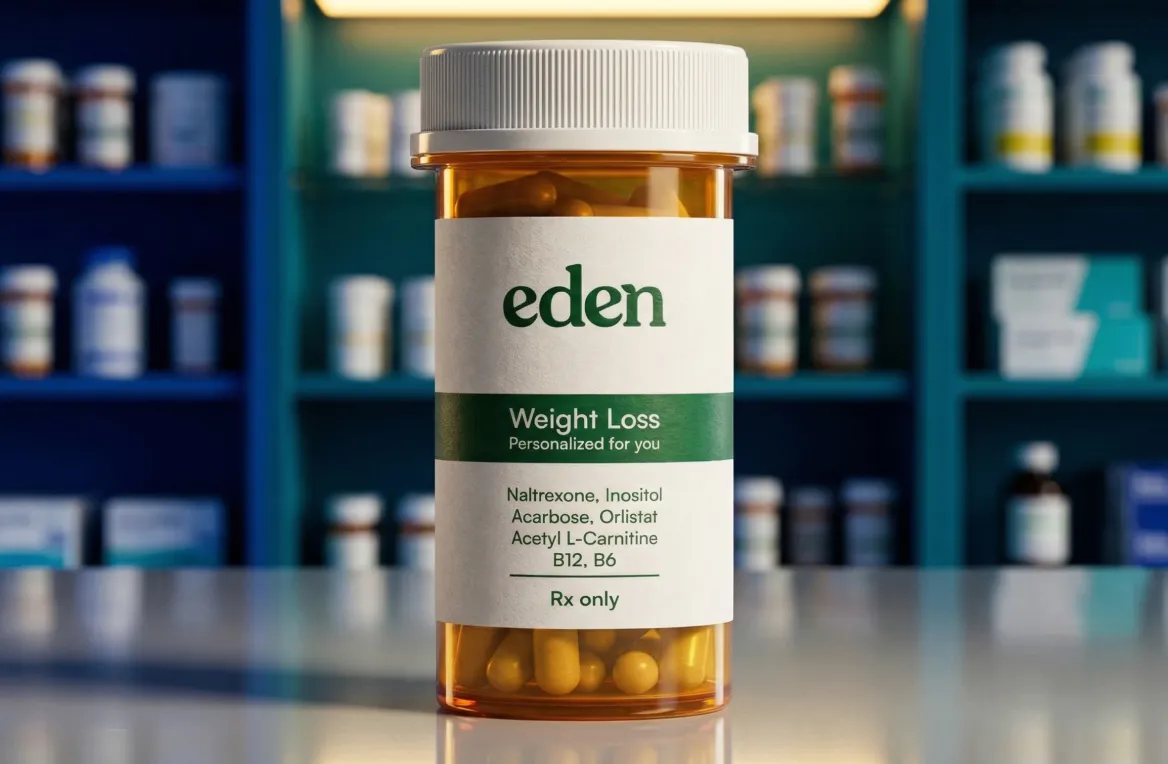How Long Does Low Dose Naltrexone Take for Weight Loss?


Low dose naltrexone (LDN): what it is, why some people discuss it for weight loss, and how long effects may take (if any).
- Low-dose naltrexone (LDN) is an off-label use of naltrexone at much lower doses than typically prescribed. Its use for weight loss is not FDA-approved, and evidence supporting weight loss effects is limited and inconclusive.
- When prescribed off-label, providers may monitor tolerance and overall response over several weeks to months.
- LDN must be prescribed by a licensed healthcare provider, and it’s important to review your full health history and any medications you’re currently taking to ensure it’s appropriate and safe for you.
This article is for informational purposes only and is not intended as medical advice. Always consult a qualified healthcare provider before starting or stopping any medication or treatment. Additionally, low-dose naltrexone is not FDA-approved for weight loss. Any discussion of off-label use is for general educational purposes only and should not be interpreted as evidence of effectiveness for weight management.

What is Low Dose Naltrexone (LDN)?
Naltrexone is an FDA-approved medication originally developed to treat opioid and alcohol use disorders. At standard doses (typically 50 mg), it works by blocking opioid receptors in the brain.
Low-dose naltrexone, or LDN, refers to naltrexone taken at much smaller doses, usually between 1.5 mg and 4.5 mg. At these lower levels, the medication behaves differently in the body and has gained attention for a range of off-label uses, including chronic pain, autoimmune conditions, and, more recently, weight management.
Because LDN is not FDA-approved for weight loss, it’s typically prescribed off-label by licensed healthcare providers and prepared by compounding pharmacies.
{{primary-cta}}
Low Dose Naltrexone for Weight Loss: Does It Work?
Research on low-dose naltrexone for weight loss is limited, and it’s not approved by the FDA for this use. While naltrexone is approved in combination with bupropion (as Contrave®) for weight management at specific doses, low-dose naltrexone alone has not been shown to independently cause weight loss or appetite suppression.
However, some clinicians may prescribe LDN off-label for other conditions, but its role in weight management remains unproven.
And although low-dose naltrexone is not FDA-approved for weight loss and has not been shown to independently cause weight loss or appetite suppression, some researchers have explored biological mechanisms that may help explain why it has been studied in metabolic and inflammatory contexts. Keep in mind that these theories are preliminary and haven’t been proven to result in weight loss.
Opioid Receptor Activity
At low doses, naltrexone temporarily blocks opioid receptors. In research settings, this mechanism has been explored for its effects on neurochemical signaling and pain modulation. The theory is it may, thus, have an impact on food cravings, but this has not been proven.
Endorphins and Mood
Some studies suggest that short-term opioid receptor blockage may lead to a rebound increase in endorphin activity, which may influence mood. This effect has primarily been investigated in relation to pain conditions and inflammatory disorders.
However, any relationship between these neurochemical changes and eating behaviors or body weight remains unclear and unproven. On the other hand, an improved mood may make it easier to stick to healthy weight management habits.
Metabolism and Insulin Sensitivity
Early research suggests low-dose naltrexone (LDN) may influence inflammation and immune signaling, both of which play a role in metabolic health. LDN has also been explored in relation to its effects on inflammatory pathways involved in insulin resistance.
However, these findings don’t establish low-dose naltrexone as a treatment for insulin resistance or weight loss. Clinical evidence demonstrating meaningful weight reduction is lacking.
It’s also worth noting that LDN is not a weight loss medication on its own. Any potential benefits are likely to work best alongside a balanced diet and regular physical activity. A licensed healthcare provider will also determine whether LDN makes sense for you and your situation.
How Long Does LDN Take to Work for Weight Loss?
Because low-dose naltrexone is not approved for weight loss, there’s no established timeline for weight-related outcomes. When prescribed off-label, licensed providers may evaluate tolerance and overall response over time rather than expecting measurable weight changes.
What to Expect in the First Few Weeks
When starting LDN, most providers begin with a low dose and gradually increase over time. This titration period allows your body to adjust and helps minimize side effects.
During the first few weeks, you may not notice any changes related to weight. Some people experience vivid dreams or mild sleep disturbances early on, which often dissipate as the body adjusts.
How Long to Give LDN a Fair Trial
Healthcare providers may recommend trying LDN for at least three to six months before deciding whether it’s well tolerated and clinically appropriate to continue. Because the effects can be subtle and build over time, stopping too early may not give the medication a fair chance.
At the same time, tracking your progress through regular check-ins with your provider can help you evaluate whether LDN is contributing to your goals and benefiting your health.
Factors Providers Consider When Prescribing LDN
When it’s prescribed off-label, responses to low-dose naltrexone vary substantially from person to person.
Dosage and Titration Schedule
Daily doses typically range from 1.5 mg to 4.5 mg. Most clinicians recommend starting with a low dose and gradually increasing it over several weeks.
This careful adjustment helps minimize side effects. Working closely with your provider can help ensure your safety and comfort throughout the process.
Consistency in Taking the Medication
LDN tends to work best when taken consistently, usually at the same time each day. Many providers recommend taking it at night, though some people tolerate it better in the morning.
Skipping doses or taking it sporadically can interfere with the steady effects LDN is meant to provide.
Underlying Health Conditions
Certain conditions may influence how your body responds to LDN. For example, people with thyroid disorders, autoimmune conditions, or chronic inflammation may experience different outcomes than those without these issues.
Diet and Lifestyle Habits
LDN is not a magic pill. For weight management goals, sustainable lifestyle habits, like a balanced diet, regular movement, adequate sleep, and stress management, are still important.
Concurrent Medications or Therapies
Other medications you’re taking can impact how LDN works. This is especially true for opioid-based medications, which can interact negatively with naltrexone.
Make sure to share your complete medication list with your provider before starting LDN. This can help reduce any interactions and, as well, ensure your safety.
{{primary-cta}}
What to Know Before Starting LDN
Before adding LDN to your routine, there are some important safety considerations to keep in mind.
Common Side Effects and How to Manage Them
Most people tolerate LDN well, but side effects can occur, especially in the early weeks. The most commonly reported include:
- Vivid dreams or nightmares
- Difficulty sleeping
- Headaches
- Nausea
- Fatigue
These effects are usually mild and tend to fade as your body adjusts. If sleep disturbances are an issue, your provider may suggest switching to a morning dose.
Interactions With Opioids and Other Drugs
Because naltrexone blocks opioid receptors, you should not take LDN if you are currently using opioid medications. This includes prescription painkillers like oxycodone, hydrocodone, and morphine, as well as opioid-based cough medicines. Combining LDN with opioids can trigger withdrawal symptoms or reduce the effectiveness of pain management.
Why a Waiting Period May Be Needed
If you’ve recently used opioids, most providers will require a washout period before prescribing LDN. This is because starting LDN too soon can cause sudden withdrawal symptoms.
Usually, a washout duration of at least 7-10 days is recommended, depending on the type of opioid and how long you were taking it for. For some longer-acting opioids (including methadone or buprenorphine), a longer interval may be needed based on provider guidance.
Final Thoughts
Research on low-dose naltrexone for weight loss remains limited, and results vary from person to person. If you’re considering LDN, the most important step is having an honest conversation with a licensed healthcare provider who knows your health history and current health status. They can help you determine if it makes sense for you and your goals.

Blog Components



The FDA does not approve compounded medications for safety, quality, or manufacturing. Prescriptions and a medical evaluation are required for certain products. The information provided on this blog is for general informational purposes only. It is not intended as a substitute for professional advice from a qualified healthcare professional and should not be relied upon as personal health advice. The information contained in this blog is not meant to diagnose, treat, cure, or prevent any disease. Readers are advised to consult with a qualified healthcare professional for any medical concerns, including side effects. Use of this blog's information is at your own risk. The blog owner is not responsible for any adverse effects or consequences resulting from the use of any suggestions or information provided in this blog.
Eden is not a medical provider. Eden connects individuals with independent licensed healthcare providers who independently evaluate each patient to determine whether a prescription treatment program is appropriate. All prescriptions are written at the sole discretion of the licensed provider. Medications are filled by state-licensed pharmacies. Please consult a licensed healthcare provider before making any medical decisions.
Frequently asked questions
No, low-dose naltrexone is not FDA-approved for weight loss. While some providers may prescribe it off-label for various conditions, its effectiveness for weight management has not been established.
Many providers recommend taking LDN at bedtime, but if sleep disturbances occur, switching to a morning dose may help reduce these side effects.
In some cases, LDN may be combined with other treatments, but this should be done only under the guidance of a licensed healthcare provider who can monitor for potential interactions.
Most people tolerate LDN well. But some people may experience mild side effects, especially in the first week. These can include vivid dreams, sleep disturbances, headaches, or gastrointestinal issues. These symptoms typically diminish as your body adjusts to the medication.
Note: The references below include background and mechanism-focused research and do not establish LDN as an effective treatment for weight loss.
Choubey, A., Girdhar, K., Kar, A. K., Kushwaha, S., Yadav, M. K., Ghosh, D., & Mondal, P. (2020). Low-dose naltrexone rescues inflammation and insulin resistance associated with hyperinsulinemia. The Journal of biological chemistry, 295(48), 16359–16369. https://doi.org/10.1074/jbc.RA120.013484
Dara, P., Farooqui, Z., Mwale, F., Choe, C., van Wijnen, A. J., & Im, H. J. (2023). Opiate Antagonists for Chronic Pain: A Review on the Benefits of Low-Dose Naltrexone in Arthritis versus Non-Arthritic Diseases. Biomedicines, 11(6), 1620. https://doi.org/10.3390/biomedicines11061620
Singh, D., & Saadabadi, A. (2023b, May 30). Naltrexone. StatPearls - NCBI Bookshelf. https://www.ncbi.nlm.nih.gov/books/NBK534811/
Support, I. (2025, December 18). Savings and support | CONTRAVE® (naltrexone HCl/bupropion HCl). CONTRAVE® (Naltrexone HCl/Bupropion HCl) for HCPs. https://contravehcp.com/savings-and-support/
Thank you!
We'll be in touch.
Thank you!



















.webp)
.webp)
.webp)
.webp)



